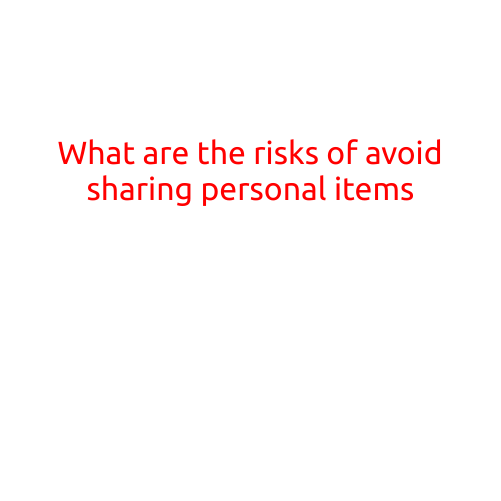
What are the risks of avoiding sharing personal items?
Sharing personal items is often met with hesitation or even outright avoidance by many individuals. Whether it’s due to concerns about germs, contamination, or loss, there are several risks associated with not sharing personal items. In this article, we’ll delve into the potential consequences of keeping personal items to oneself, and explore the benefits of sharing.
Risk of Inadequate Hygiene
One of the most significant risks of avoiding sharing personal items is the potential for inadequate hygiene. When we don’t share, we’re more likely to hold onto items that have come into contact with our skin, clothes, or environment. This can lead to the accumulation of dirt, dust, and other allergens that can contribute to respiratory issues, skin problems, and other health concerns.
Risk of Infection
Sharing personal items is often met with concerns about the risk of infection. When we borrow items from others, there’s a risk that we may be exposed to germs, bacteria, or viruses that can cause illness. However, when we don’t share, we’re more likely to harbor germs and bacteria within our own personal space, increasing the risk of transmission to others and potentially spreading diseases.
Risk of Emotional Distance
Sharing personal items can also have emotional benefits. When we share with others, we’re more likely to form deeper connections and develop stronger bonds. In contrast, avoiding sharing can lead to emotional distance and a sense of disconnection from others. This can be particularly problematic in close relationships, where sharing and intimacy are essential for building trust and understanding.
Risk of Material Possessions Overload
Finally, avoiding sharing personal items can lead to a buildup of material possessions. When we keep everything to ourselves, we’re more likely to accumulate unnecessary items, clutter our living spaces, and potentially contribute to environmental waste. This can lead to feelings of overwhelm, stress, and anxiety, which can negatively impact our mental and emotional well-being.
Conclusion
While it’s natural to have concerns about sharing personal items, the risks associated with avoiding sharing far outweigh the benefits. By sharing, we can reduce the risk of infection, promote emotional connection, and cultivate a sense of community and cooperation. Additionally, sharing can help us develop a sense of empathy and understanding, as we learn to appreciate the experiences and perspectives of others.
In conclusion, the risks of avoiding sharing personal items are significant and far-reaching. By embracing sharing and the connections it brings, we can improve our physical and emotional health, while also fostering deeper relationships and contributing to a more harmonious and sustainable world.





